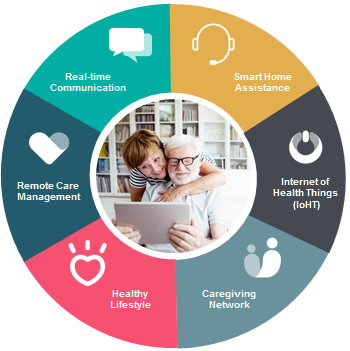The M-Sec Project Big Data, IoT and Blockchain for smart(er) cities
01 / 06 / 2019
Since July 2018, and until June 2021, Worldline is leading, at European level, the M-Sec Project, a collaborative initiative between Europe and Japan, investing in new technologies in the spheres of Big Data, IoT, Blockchain and Cloud computing.

This project aims to empower local and municipal governments, citizens, researchers, entrepreneurs and businesses between Japan and the EU to work together, create new connections and employ innovative new solutions to typical urban problems. The main objective is the development of an innovative and secure platform with different layers of security to guarantee the confidentiality, authenticity and veracity of sensitive data at all levels of the process, providing an end-to-end solution upon which stakeholders can build innovative smart city applications.

The results will be validated in six pilot use cases. For this, M-Sec has two cities: Santander (Spain) and Fujisawa (Japan), each of them recognized for having developed a long-term smart city approach.
The use cases will bring a number of benefits: help citizens monitor their environment (adjust air quality, avoid traffic, stay safe during natural disasters); empower elderly populations’ quality of life at home and wellbeing monitoring; allow citizens to act as live feedback “sensors”; bring playful elements to the city (smart parking animation, etc.), and more.
On 9-11 April 2019, M-Sec partners met in Fujisawa, for the second Project Meeting. For this 3-day face-to-face meeting, the partners gathered in Fujisawa City Hall to discuss the status of the project as well as to set what the next steps will be.

 Day One was mostly dedicated to the different use cases (pilot tests) which will take place in Fujisawa, Japan, and Santander, Spain. An interesting discussion was held on how the cross-border (both Santander and Fujisawa) use cases will be managed, given that these two are the most complex to develop.
Day One was mostly dedicated to the different use cases (pilot tests) which will take place in Fujisawa, Japan, and Santander, Spain. An interesting discussion was held on how the cross-border (both Santander and Fujisawa) use cases will be managed, given that these two are the most complex to develop.
Worldline, as the owner of one of the six use cases, called “Home Monitoring and Wellbeing Tele-Assistance” made a recap regarding the functionalities to be provided within this use case. The solution provided will be based on the Worldline Connected Care Platform, A B2B2C, SaaS-based, IoT platform featuring integrated components to enable tele-assistance, remote health monitoring and user-centric wellbeing solutions.
Day two saw a discussion about the M-Sec Architecture. An initial run-down was given on the security (application level security, overall end-to-end security) of the technologies to be employed (Cloud, IoT, Blockchain etc.), including a demo of each of the assets that will be used to develop the M-Sec platform.

Day three gave the opportunity for the partners to discuss the ethics of the project including enforced GDPR regulations, consent and data transfer for the cross-border pilots. Finally, the next steps for M-Sec were discussed in terms of management and next meetings, to be held in Tokyo (September 2019) and Santander (November 2019).

